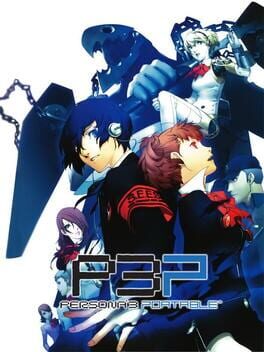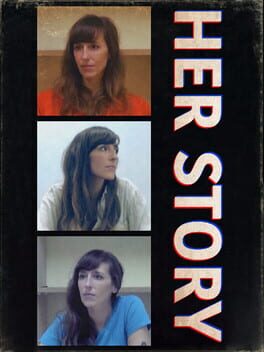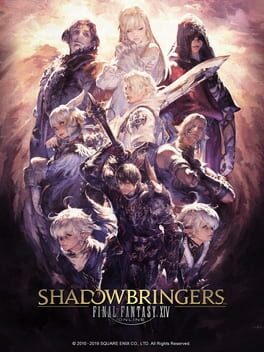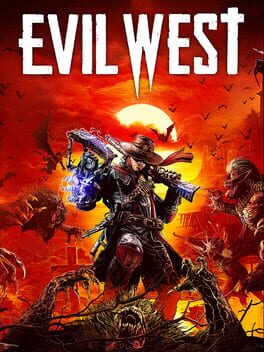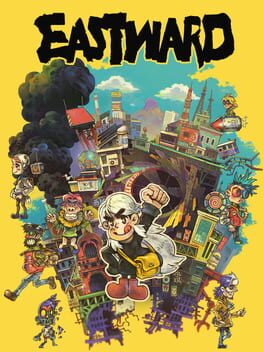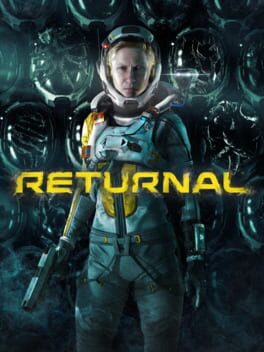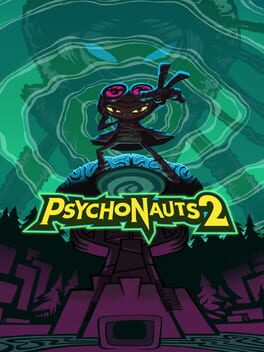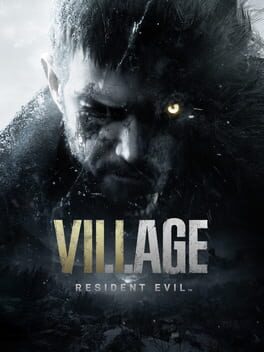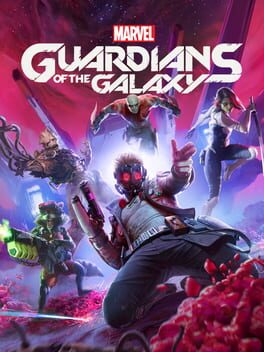AlexDiesTwice
26 reviews liked by AlexDiesTwice
After two years of journeying through the vast, rich world of Eorzea, Final Fantasy XIV: Endwalker brought me to a poignant, reflective halt as I watched the credits roll. This is more than simply a game review; it's an account of a transformative experience, a celebration of the art of storytelling, and an exploration of the core of what it is to be human. I've been thinking about this masterpiece for four days, and now I'm ready to express my opinions.
I'd like to briefly touch upon the gameplay. My gaming experience was completely changed by the addition of NPCs who followed and interacted with me on my adventures instead of just meeting up at certain locations. Checkpoint dialogues with characters like as G'raha, Alisaie, Estinien, and many more seemed more like genuine moments of connection and narrative richness than just marks of progress. With the addition of what could be the best combat music in the series, the dungeons and trials turned every battle into an unforgettable symphony of hardship and victory. The music crafted by Masayoshi Soken, particularly the songs On Blade's Edge, The Final Day, and Flow Together, has greatly raised the bar for my favorite OSTs alongside Shadowbringers.
The story of Endwalker, interlaced with the rich fabric of Ascian mythology, unveiled an epic full of existential crises and deep epiphanies. The plot took a surprising and profound turn with Zodiark's early demise, along with Hermes and Meteion's inclusion to the narrative. The story of Meteion, who's sisters traveled the universe and saw horrors far and wide, offered a tragic picture that forced reevaluation of how fleeting existence is in the face of unavoidable disintegration.
The Ultima Thule expedition is the apex of Endwalker's narrative. Close in the Distance did more than just establish the mood; when it slowly filled the eerie, hollow spaces of this last zone, it spoke straight to my soul. As I struggled with existential dread, this music, resonating through the memories of departed civilizations and Scions, became a source of understanding for me. It emphasized the idea of accepting death as a necessary part of life—not with hopelessness, but with a resolve to treasure each brief moment and stand tall.
One of the highlights of my gaming experience was facing the Endsinger as a Paladin. Final Fantasy XIV did what it does best—it flipped the script in the most dramatic and exhilarating way possible. As we braced for our inevitable defeat with the second Oblivion, the Scions' voices pierced through the despair and With Hearts Aligned began to play. After feeling so hopeless before, I couldn't help but yell with excitement. The dramatic shift from being on the edge of defeat to being carried away by this wave of hope and encouragement from well-loved characters was a masterful work of narrative and emotional design that demonstrated the game's unmatched storytelling abilities.
And then I reached true turning point of Endwalker—the confrontation with Zenos, the pinnacle of a conflict that spanned three expansions. When Zenos asked if I enjoyed the same thrills from fighting to the death, I replied that I did, a moment that chilled my spine and brought to light the complex relationship between enemies. My character Guinevere's sly acknowledgement of the rivalry, which had been built up over years of story development, highlighted this battle as more than simple one; it was a very intimate affair that signaled the end of an era and the deep journey I, as a player, had begun.
I could talk forever about this expansion, or better still, Final Fantasy XIV in its entirety. It's one of those rare games that completely changed the way I thought about video games as a medium. It's been a life-changing experience that has altered the way I think about video game storytelling and its ability to reflect the complexity of existential reflection, love, and life. Beyond just being entertained during the course of these two years, I have learned invaluable lessons about life's meaning, the importance of spending time with the people we love, and the courage that comes with accepting what is unavoidable.
Not only has Creative Business Unit III created a masterclass game, but they have crafted a profoundly uplifting experience that goes beyond the digital realm and touches the very essence of what it is to be human. I sincerely invite anyone who is intimidated by the complexity of massively multiplayer online games to give Eorzea a try. The Final Fantasy XIV experience is completely transformational, the journey is extensive, and the teachings are priceless. I look forward to the release of Dawntrail this July.
Thank you, Naoki Yoshida.
I'd like to briefly touch upon the gameplay. My gaming experience was completely changed by the addition of NPCs who followed and interacted with me on my adventures instead of just meeting up at certain locations. Checkpoint dialogues with characters like as G'raha, Alisaie, Estinien, and many more seemed more like genuine moments of connection and narrative richness than just marks of progress. With the addition of what could be the best combat music in the series, the dungeons and trials turned every battle into an unforgettable symphony of hardship and victory. The music crafted by Masayoshi Soken, particularly the songs On Blade's Edge, The Final Day, and Flow Together, has greatly raised the bar for my favorite OSTs alongside Shadowbringers.
The story of Endwalker, interlaced with the rich fabric of Ascian mythology, unveiled an epic full of existential crises and deep epiphanies. The plot took a surprising and profound turn with Zodiark's early demise, along with Hermes and Meteion's inclusion to the narrative. The story of Meteion, who's sisters traveled the universe and saw horrors far and wide, offered a tragic picture that forced reevaluation of how fleeting existence is in the face of unavoidable disintegration.
The Ultima Thule expedition is the apex of Endwalker's narrative. Close in the Distance did more than just establish the mood; when it slowly filled the eerie, hollow spaces of this last zone, it spoke straight to my soul. As I struggled with existential dread, this music, resonating through the memories of departed civilizations and Scions, became a source of understanding for me. It emphasized the idea of accepting death as a necessary part of life—not with hopelessness, but with a resolve to treasure each brief moment and stand tall.
One of the highlights of my gaming experience was facing the Endsinger as a Paladin. Final Fantasy XIV did what it does best—it flipped the script in the most dramatic and exhilarating way possible. As we braced for our inevitable defeat with the second Oblivion, the Scions' voices pierced through the despair and With Hearts Aligned began to play. After feeling so hopeless before, I couldn't help but yell with excitement. The dramatic shift from being on the edge of defeat to being carried away by this wave of hope and encouragement from well-loved characters was a masterful work of narrative and emotional design that demonstrated the game's unmatched storytelling abilities.
And then I reached true turning point of Endwalker—the confrontation with Zenos, the pinnacle of a conflict that spanned three expansions. When Zenos asked if I enjoyed the same thrills from fighting to the death, I replied that I did, a moment that chilled my spine and brought to light the complex relationship between enemies. My character Guinevere's sly acknowledgement of the rivalry, which had been built up over years of story development, highlighted this battle as more than simple one; it was a very intimate affair that signaled the end of an era and the deep journey I, as a player, had begun.
I could talk forever about this expansion, or better still, Final Fantasy XIV in its entirety. It's one of those rare games that completely changed the way I thought about video games as a medium. It's been a life-changing experience that has altered the way I think about video game storytelling and its ability to reflect the complexity of existential reflection, love, and life. Beyond just being entertained during the course of these two years, I have learned invaluable lessons about life's meaning, the importance of spending time with the people we love, and the courage that comes with accepting what is unavoidable.
Not only has Creative Business Unit III created a masterclass game, but they have crafted a profoundly uplifting experience that goes beyond the digital realm and touches the very essence of what it is to be human. I sincerely invite anyone who is intimidated by the complexity of massively multiplayer online games to give Eorzea a try. The Final Fantasy XIV experience is completely transformational, the journey is extensive, and the teachings are priceless. I look forward to the release of Dawntrail this July.
Thank you, Naoki Yoshida.
Inscryption
2021
This review contains spoilers
Wow what a wild fucking ride, and really tough to talk about without delving into spoilers.So I'm going to have too here just a little. I'm gonna mark it as spoiler warning and try not to go too crazy, but some of this stuff just needs to be talked about to get a review out.
So, this is really a tale of three games, then a wild ending. The first part of this game is immaculate. A five out of five from me from act one, from the gameplay mechanics, to the atmosphere, to the exploration around the cabin. This is the best part of the game for me full stop, and leaves such a fantastic lasting impression.
Then you start to get the video bits intermixed in, which I loved, the backstory, and trying to piece together exactly what the hell is going on here.
Act 2, is the weakest act for me. I appreciate what it's doing as a bridge, and visually it looks awesome, love the pixel art, but I found it just fine, and the gameplay in that part isn't nearly as fun as the first or third acts, and I was mostly happy to be done that part fairly quickly. 3/5.
The third act is great. I definitely don't love it as much as the first, but exploring the map, and being able to choose your path, and again, exploring an area around you in between matches. Just great stuff. 4/5
Then the ending. Just bat shit insane, I love it. I don't fully understand it all, but it really uses the medium of video games effectively to create something special that would be hard to do otherwise.
Overall, I really dug this game a lot. While it's not perfect, and it can never quite hit the peak of the first act (besides the ending which is phenomenal) this is a game well worth your time, and a must play. Kudos to such a unique experience.
So, this is really a tale of three games, then a wild ending. The first part of this game is immaculate. A five out of five from me from act one, from the gameplay mechanics, to the atmosphere, to the exploration around the cabin. This is the best part of the game for me full stop, and leaves such a fantastic lasting impression.
Then you start to get the video bits intermixed in, which I loved, the backstory, and trying to piece together exactly what the hell is going on here.
Act 2, is the weakest act for me. I appreciate what it's doing as a bridge, and visually it looks awesome, love the pixel art, but I found it just fine, and the gameplay in that part isn't nearly as fun as the first or third acts, and I was mostly happy to be done that part fairly quickly. 3/5.
The third act is great. I definitely don't love it as much as the first, but exploring the map, and being able to choose your path, and again, exploring an area around you in between matches. Just great stuff. 4/5
Then the ending. Just bat shit insane, I love it. I don't fully understand it all, but it really uses the medium of video games effectively to create something special that would be hard to do otherwise.
Overall, I really dug this game a lot. While it's not perfect, and it can never quite hit the peak of the first act (besides the ending which is phenomenal) this is a game well worth your time, and a must play. Kudos to such a unique experience.
Persona 3 Reload
2024
The long-awaited remake of my favorite game of all time did it justice as it deserved. With updated graphics, numerous QoL changes and a few enhancements to the already immaculate story, this is the definitive version to enjoy this amazing Journey.
Dungeon crawling segments don't feel like a chore and those are perfectly balanced with the daily life-sim portions, which together make for one of the most unique experiences you can have with a turn-based RPG nowadays.
Things like Theurgy and the encounter design philosophies that Atlus applied to their games throughout the last years can be found here, making for an incredibly satisfying combat experience where you can be easily knocked out if you blink for a second, but can completely turn the tides with a simple good move. You'll be OP by endgame, but Superbosses will definitely make you think twice about your strategies.
Characters feel more alive than ever, from the main cast to the side characters you meet along the way. And it's way easier to empathize with them all now that they're fully voiced. From spending time with the girl facing her parents' divorce or helping a strange, drunken monk to get his life back on track, every hour spent here is irreplaceable.
The way this game manages its themes is a masterpiece on its own. At the same time you face loss and the inevitability of death, you'll experience hope, happiness and everything in between. From start to finish, this experience can (and will) bring you to tears many times. It made a lasting impression on me 10 years ago, and I'm glad to see it hasn't lost its edge just yet.
Dungeon crawling segments don't feel like a chore and those are perfectly balanced with the daily life-sim portions, which together make for one of the most unique experiences you can have with a turn-based RPG nowadays.
Things like Theurgy and the encounter design philosophies that Atlus applied to their games throughout the last years can be found here, making for an incredibly satisfying combat experience where you can be easily knocked out if you blink for a second, but can completely turn the tides with a simple good move. You'll be OP by endgame, but Superbosses will definitely make you think twice about your strategies.
Characters feel more alive than ever, from the main cast to the side characters you meet along the way. And it's way easier to empathize with them all now that they're fully voiced. From spending time with the girl facing her parents' divorce or helping a strange, drunken monk to get his life back on track, every hour spent here is irreplaceable.
The way this game manages its themes is a masterpiece on its own. At the same time you face loss and the inevitability of death, you'll experience hope, happiness and everything in between. From start to finish, this experience can (and will) bring you to tears many times. It made a lasting impression on me 10 years ago, and I'm glad to see it hasn't lost its edge just yet.
Persona 3 Portable
2009
Infinite Wealth is alot to digest when you get down to brass tacks. It's the game that really solidified my belief in RGG Studio's mastery of gameplay loops and feedback systems, with every inch of the game being stuffed with content - every 5 minutes you're knocking off completion list achievements which feed into your personality and bond levels and so on and so forth. My time is never wasted at any point. The combat is engaging and fun and satisfying and is going to make ever returning to Like A Dragon a pain in the ass due to how GOOD all the improvements are. Hawaii as a location is incredible and features some of the best minigames seen in the franchise.
Where I take pause is I don't feel like this was an Ichiban game. This is very much a Kiryu story, right down to the game's theme of atonement. The game tries really hard to figure out a way to get Ichiban to Hawaii and to meet up with Kiryu but it doesn't feel natural in its execution. Additionally, as with all Yakuza games, the game does sag a bit in the middle of the game - but the constant introduction to new systems, jobs and minigames made things feel fresh and exciting, even when the overall narrative was taking a bit of a backseat. I understand that Ichiban is the new protagonist as of Like A Dragon 7, but I feel like his inclusion was an overall detriment to the game's storytelling. His plotline didn't feel nearly as fleshed out or taken seriously by the writers compared to Kiryu's beautifully done storyline.
That being said - Infinite Wealth really proved to me that Ichiban is one of the best JRPG protagonists in gaming right now, and Kiryu Kazuma is one of the most humanly written characters in the medium. Despite my woes with the narrative overall, I was still thoroughly entertained by Ichiban and I have no worries about him being the LAD protagonist in future games.
I did think the ending was very well done, and I think it was respectful enough that it opened and closed some doors narratively. No matter what, Kiryu is treated with the utmost reverence and respect by RGG (even with Toshihiro Nagoshi departing the studio) - and at no point did I feel like the emotional threads were cheap or weakly implemented into the story.
Some minor complaints and nitpicks I have are the lack of level suggestions on substories was frustrating at points as I'd wander into a substory with a fight where I am way below the intended level for the quest. Also, while combat is great, an animation skip for enemies or fast-forward option would've been a great inclusion for the longer, multi-enemy fights where I'm waiting for 6 people to take their turn.
I greatly enjoyed my overall experience with Infinite Wealth and being in Hawaii. I don't know how RGG will one-up themselves with the next mainline entry or where it will go narratively, but I have full confidence in post-Nagoshi RGG Studios to deliver.
Where I take pause is I don't feel like this was an Ichiban game. This is very much a Kiryu story, right down to the game's theme of atonement. The game tries really hard to figure out a way to get Ichiban to Hawaii and to meet up with Kiryu but it doesn't feel natural in its execution. Additionally, as with all Yakuza games, the game does sag a bit in the middle of the game - but the constant introduction to new systems, jobs and minigames made things feel fresh and exciting, even when the overall narrative was taking a bit of a backseat. I understand that Ichiban is the new protagonist as of Like A Dragon 7, but I feel like his inclusion was an overall detriment to the game's storytelling. His plotline didn't feel nearly as fleshed out or taken seriously by the writers compared to Kiryu's beautifully done storyline.
That being said - Infinite Wealth really proved to me that Ichiban is one of the best JRPG protagonists in gaming right now, and Kiryu Kazuma is one of the most humanly written characters in the medium. Despite my woes with the narrative overall, I was still thoroughly entertained by Ichiban and I have no worries about him being the LAD protagonist in future games.
I did think the ending was very well done, and I think it was respectful enough that it opened and closed some doors narratively. No matter what, Kiryu is treated with the utmost reverence and respect by RGG (even with Toshihiro Nagoshi departing the studio) - and at no point did I feel like the emotional threads were cheap or weakly implemented into the story.
Some minor complaints and nitpicks I have are the lack of level suggestions on substories was frustrating at points as I'd wander into a substory with a fight where I am way below the intended level for the quest. Also, while combat is great, an animation skip for enemies or fast-forward option would've been a great inclusion for the longer, multi-enemy fights where I'm waiting for 6 people to take their turn.
I greatly enjoyed my overall experience with Infinite Wealth and being in Hawaii. I don't know how RGG will one-up themselves with the next mainline entry or where it will go narratively, but I have full confidence in post-Nagoshi RGG Studios to deliver.
Her Story
2015
So after seeing Sam Barlow's new games announced (and immortality being one of my favorite games of 2022, I figured it was high time I finally got back to this and finished it (I had started it a long time ago). I knew it was short, and it wouldn't take me too long.
What unfolded over the next three hours was just a wonderful, creepy, chilling, moving, and just all around great little story. I do wish there was a bit more meat on the bone here so to speak (something that Immortality definitely improves on), but this is still something worth checking out one rainy afternoon when you got nothing else going on.
Sam Barlow is a wonderful creative force in this industry, and I can't wait to see what they do next!!!
What unfolded over the next three hours was just a wonderful, creepy, chilling, moving, and just all around great little story. I do wish there was a bit more meat on the bone here so to speak (something that Immortality definitely improves on), but this is still something worth checking out one rainy afternoon when you got nothing else going on.
Sam Barlow is a wonderful creative force in this industry, and I can't wait to see what they do next!!!
Final Fantasy XIV has come a long way since its rocky launch. With Heavensward, the game earned my heart, and with Shadowbringers, it earned my entire soul and being, igniting a deep appreciation for its masterful storytelling, character development, and world-building. This expansion isn't just a game; it's an experience that will leave you pondering the depths of existence, mourning fallen heroes, and cheering for victories earned through sacrifice.
Gone are the days of forgettable character arcs. Shadowbringers takes beloved companions like Thancred, Urianger, and Alisaie, strips them bare, and rebuilds them into versions that resonate on a profound level. They grapple with loss, regret, and the weight of their past, emerging stronger and more relatable than ever before.
These two characters are masterclasses in complexity. Emet-Selch's unwavering dedication to his lost Ascians, despite his morally ambiguous methods, makes him a villain you can't help but sympathize with. After all, if you lost your family and people to the forgotten threads of time and fate, what wouldn't you do to bring them back? Emet-Selch's plight and motives are not so different from our characters, and it really speaks volumes when you see the Scions trying to reason with him rather than be dead-set on destroying him.
And the Exarch, shrouded in mystery and burdened by an impossible task, offers a glimpse into the depths of selflessness. Every word they utter carries weight, leaving an indelible mark on your soul. From his selfless imprisonment in the Crystal Tower to his ultimate sacrifice to restore balance, G'raha Tia exemplifies the unwavering spirit of heroism. His journey and sacrifices throughout the game culminate into a poignant moment in the Crystal Tower, showcasing the exceptional writing of Shadowbringers. His redemption and chance at a renewed life are pushed me to tears, solidifying his place as my favorite character in Final Fantasy.
And don't let anyone tell you Ryne is just a whiny kid. Under the oppressive burden of expectation and manipulation due to her role as the Oracle of Light, she blossoms into a confident warrior, showcasing the resilience of the human spirit. Once she comes into acceptance of her purpose and she decides to fight for others rather than protect herself, it's an incredible moment that left an impact in my heart. Her arc is a testament to the power of growth and determination, earning her a well-deserved place among the Scions.
Shadowbringers doesn't disappoint on the gameplay front either. The 70-80 level range unlocks a wealth of abilities, making combat dynamic and engaging. Raids like Nier and Eden (atleast the parts I've done so far), along with stunning locales like the Amh Araeng, offer exhilarating challenges and experiences that put your skills to the test. I felt like the dungeons in Shadowbringers so far have been the most creative and fun, to where I really had no complaints unlike Stormblood's content.
As I reflect on my final moments in this incredible journey, the concluding boss battle stands out as a touching and intimate experience. Encouraged by a friend, I took on the role of tank for this significant encounter, activating my tank stance to draw the boss's attention entirely to me. This decision added a layer of fulfillment, making me realize that my year-long journey had led to one of the most satisfying fights in my gaming career. The impact of this battle was heightened by a visually stunning and epic spectacle, complemented by Masayoshi Soken's phenomenal "To The Edge." This composition, born from Soken's own struggles and battle with cancer, adds an extra layer of significance to the entire journey. It serves as a testament to the passion and soul poured into every facet of this experience, not only by Soken himself but also by the entire development team and the industry-defining history of Final Fantasy.
Even as a newcomer to this franchise, I could keenly feel the love and respect woven into Shadowbringers' tapestry. The numerous references and callbacks to past Final Fantasy games resonated throughout, offering a rewarding experience for longtime fans while remaining accessible to newcomers. It's a celebration of the series' rich history, inspiring me to delve even deeper into its captivating world.
Shadowbringers is more than just a game; it's an emotional odyssey that will stay with you long after you've finished it. The characters you meet and grow with feel like they're real people you know, and you come to treasure them like family. It's a testament to the power of videogame storytelling, character development, and the human spirit that channels through all of us. It's about how mankind overcomes the struggles of tragedy and how they rebuild their lives. So, if you're looking for an experience that will make you laugh, cry, and contemplate the very meaning of existence, look no further. Immerse yourself in the world of Shadowbringers, and let it ignite your soul.
Gone are the days of forgettable character arcs. Shadowbringers takes beloved companions like Thancred, Urianger, and Alisaie, strips them bare, and rebuilds them into versions that resonate on a profound level. They grapple with loss, regret, and the weight of their past, emerging stronger and more relatable than ever before.
These two characters are masterclasses in complexity. Emet-Selch's unwavering dedication to his lost Ascians, despite his morally ambiguous methods, makes him a villain you can't help but sympathize with. After all, if you lost your family and people to the forgotten threads of time and fate, what wouldn't you do to bring them back? Emet-Selch's plight and motives are not so different from our characters, and it really speaks volumes when you see the Scions trying to reason with him rather than be dead-set on destroying him.
And the Exarch, shrouded in mystery and burdened by an impossible task, offers a glimpse into the depths of selflessness. Every word they utter carries weight, leaving an indelible mark on your soul. From his selfless imprisonment in the Crystal Tower to his ultimate sacrifice to restore balance, G'raha Tia exemplifies the unwavering spirit of heroism. His journey and sacrifices throughout the game culminate into a poignant moment in the Crystal Tower, showcasing the exceptional writing of Shadowbringers. His redemption and chance at a renewed life are pushed me to tears, solidifying his place as my favorite character in Final Fantasy.
And don't let anyone tell you Ryne is just a whiny kid. Under the oppressive burden of expectation and manipulation due to her role as the Oracle of Light, she blossoms into a confident warrior, showcasing the resilience of the human spirit. Once she comes into acceptance of her purpose and she decides to fight for others rather than protect herself, it's an incredible moment that left an impact in my heart. Her arc is a testament to the power of growth and determination, earning her a well-deserved place among the Scions.
Shadowbringers doesn't disappoint on the gameplay front either. The 70-80 level range unlocks a wealth of abilities, making combat dynamic and engaging. Raids like Nier and Eden (atleast the parts I've done so far), along with stunning locales like the Amh Araeng, offer exhilarating challenges and experiences that put your skills to the test. I felt like the dungeons in Shadowbringers so far have been the most creative and fun, to where I really had no complaints unlike Stormblood's content.
As I reflect on my final moments in this incredible journey, the concluding boss battle stands out as a touching and intimate experience. Encouraged by a friend, I took on the role of tank for this significant encounter, activating my tank stance to draw the boss's attention entirely to me. This decision added a layer of fulfillment, making me realize that my year-long journey had led to one of the most satisfying fights in my gaming career. The impact of this battle was heightened by a visually stunning and epic spectacle, complemented by Masayoshi Soken's phenomenal "To The Edge." This composition, born from Soken's own struggles and battle with cancer, adds an extra layer of significance to the entire journey. It serves as a testament to the passion and soul poured into every facet of this experience, not only by Soken himself but also by the entire development team and the industry-defining history of Final Fantasy.
Even as a newcomer to this franchise, I could keenly feel the love and respect woven into Shadowbringers' tapestry. The numerous references and callbacks to past Final Fantasy games resonated throughout, offering a rewarding experience for longtime fans while remaining accessible to newcomers. It's a celebration of the series' rich history, inspiring me to delve even deeper into its captivating world.
Shadowbringers is more than just a game; it's an emotional odyssey that will stay with you long after you've finished it. The characters you meet and grow with feel like they're real people you know, and you come to treasure them like family. It's a testament to the power of videogame storytelling, character development, and the human spirit that channels through all of us. It's about how mankind overcomes the struggles of tragedy and how they rebuild their lives. So, if you're looking for an experience that will make you laugh, cry, and contemplate the very meaning of existence, look no further. Immerse yourself in the world of Shadowbringers, and let it ignite your soul.
Evil West
2022
Feel like the longer I played it the more I wanted to dislike the game but it somehow kept making me want to play it. When the combat starts flowing, especially in coop, the game can be very satisfying. You unlock new weapons and upgrades at a good rate and everything has a lot of weight behind it. Story is background but the world is cool.
Like a Dragon Gaiden pays a heartfelt homage to Kazuma Kiryu, cementing the Dragon of Dojima's legendary status as one of the greatest videogame characters of all time. As a dedicated Yakuza enthusiast, diving into Gaiden felt like a pilgrimage to the core foundations of the series, creating an ultimate celebration of Yakuza's storied history while injecting a refreshing narrative full of crazy twists.
Set against the backdrop of Yakuza: Like a Dragon, Gaiden asserts itself as a standalone entry, crafting one of the most unique tie-in gaming experiences I've encountered. The narrative weaves a deep and personal tale, skillfully drawing on elements from previous games to resonate with long-time fans while introducing new layers to the lore.
The combat system in Gaiden, utilizing the robust Dragon Engine, showcases a branching from the style seen in the Judgment series. The introduction of the addicting Agent style, reminiscent of the agile Crane style used by Takayuki Yagami, adds a layer of excitement to large group encounters. The game's emphasis on facing larger mobs of enemies highlights the developers' commitment to providing a thrilling and dynamic combat experience, encouraging players to experiment with an arsenal of gadgets and abilities.
One of the standout features of the Yakuza series has consistently been its electrifying and intense soundtrack, and Gaiden lives up to this tradition. The blend of EDM, heavy rock, and high-energy pop creates a sonic landscape that is quintessentially the soul of Ryu Ga Gotoku. Standout tracks like Hellish Octagon, Bring It On, Fleeting Dream, Like A Butterfly, and Deadly Struggle contribute to an OST that is not only memorable but also a strong contender for my personal soundtrack of the year for 2023.
Avoiding a deep dive into the story to preserve the impact for fellow Kiryu enthusiasts, I can't help but emphasize the emotional connection I felt throughout the narrative. Kiryu, a character I've cherished since my teenage years, delivers a poignant experience that culminated in a 2am emotional rollercoaster, leaving me in tears. As I eagerly await the release of Like a Dragon 8, Gaiden stands as a testament to the developers' dedication to creating a game tailored for Kiryu fans worldwide. It undeniably deserves to be hailed as the peak of the Yakuza series, offering an immersive and emotional journey that resonates long after the credits roll.
Set against the backdrop of Yakuza: Like a Dragon, Gaiden asserts itself as a standalone entry, crafting one of the most unique tie-in gaming experiences I've encountered. The narrative weaves a deep and personal tale, skillfully drawing on elements from previous games to resonate with long-time fans while introducing new layers to the lore.
The combat system in Gaiden, utilizing the robust Dragon Engine, showcases a branching from the style seen in the Judgment series. The introduction of the addicting Agent style, reminiscent of the agile Crane style used by Takayuki Yagami, adds a layer of excitement to large group encounters. The game's emphasis on facing larger mobs of enemies highlights the developers' commitment to providing a thrilling and dynamic combat experience, encouraging players to experiment with an arsenal of gadgets and abilities.
One of the standout features of the Yakuza series has consistently been its electrifying and intense soundtrack, and Gaiden lives up to this tradition. The blend of EDM, heavy rock, and high-energy pop creates a sonic landscape that is quintessentially the soul of Ryu Ga Gotoku. Standout tracks like Hellish Octagon, Bring It On, Fleeting Dream, Like A Butterfly, and Deadly Struggle contribute to an OST that is not only memorable but also a strong contender for my personal soundtrack of the year for 2023.
Avoiding a deep dive into the story to preserve the impact for fellow Kiryu enthusiasts, I can't help but emphasize the emotional connection I felt throughout the narrative. Kiryu, a character I've cherished since my teenage years, delivers a poignant experience that culminated in a 2am emotional rollercoaster, leaving me in tears. As I eagerly await the release of Like a Dragon 8, Gaiden stands as a testament to the developers' dedication to creating a game tailored for Kiryu fans worldwide. It undeniably deserves to be hailed as the peak of the Yakuza series, offering an immersive and emotional journey that resonates long after the credits roll.
Eastward
2021
I've never before seen a game where the presentation is so leagues better than everything else it has to offer. Eastward is gorgeous in terms of graphics, music and art direction. Phenomenal. The gameplay, however, is bland and uninspired, and a story that starts pretty strong is bogged down by some absolutely horrendous pacing, and a lot of things which leave the player confused. So much of this game feels like nothing would be lost were it cut. Thanks to plot, characters met in one part of the game are often left behind to meet new ones. However, the main cast NEVER acknowledges the peiple they left behind with few key exceptions. WHY DID I SPEND FIVE HOURS IN THIS AREA IF NOTHING I DID THERE AFFECTS THE WIDER PLOT!?!? The gane also didn't feel well optimised for the Switch. This is ine of if not the only game I've played that just crashed decently regularly. There was also a weird effect where the game didn't seem to cover the screen at the edges for whatever reason. This game is frustrating, because there is a lot to love, but the pacing most of all made me avoid playing quite a bit. A 20 ish hour game should not take me ten months, but Eastward is one I couldn't bear to sit down and play regularly, and also one I think could have been five to ten hours shorter, making kt a much better experience. I will say I love the presentation, a number of characters, and the story's high points are pretty good, but I can't seem to ignore my issues.



